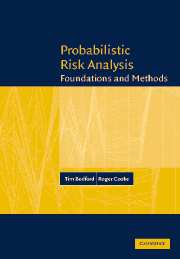Book contents
- Frontmatter
- Contents
- Illustrations
- Tables
- Preface
- Part I Introduction
- Part II Theoretical issues and background
- Part III System analysis and quantification
- 6 Fault and event trees
- 7 Fault trees – analysis
- 8 Dependent failures
- 9 Reliability data bases
- 10 Expert opinion
- 11 Human reliability
- 12 Software reliability
- Part IV Uncertainty modeling and risk measurement
- Bibliography
- Index
12 - Software reliability
from Part III - System analysis and quantification
Published online by Cambridge University Press: 05 June 2012
- Frontmatter
- Contents
- Illustrations
- Tables
- Preface
- Part I Introduction
- Part II Theoretical issues and background
- Part III System analysis and quantification
- 6 Fault and event trees
- 7 Fault trees – analysis
- 8 Dependent failures
- 9 Reliability data bases
- 10 Expert opinion
- 11 Human reliability
- 12 Software reliability
- Part IV Uncertainty modeling and risk measurement
- Bibliography
- Index
Summary
In this chapter we discuss some of the problems associated with judging the quality and reliability of software. In particular, we look at a few of the statistical models that have been used to quantify software reliability. Good sources on software reliability are the book of Musa [Musa, 1998] which is quite practical but concentrates on just a couple of software reliability models, and the survey of Littlewood in [Bittanti, 1988] which concentrates on the statistical models.
Although many of the statistical models for reliability prediction were developed in the 1970s and 1980s, [Musa, 1998] makes a strong case for the continued need for reliability prediction, in particular due to the introduction of new programming techniques such as object oriented programming.
Qualitative assessment – ways to find errors
Few programs run perfectly the first time they are executed, and programmers have to spend a long time on debugging a new program until all errors are eliminated. Many modern development environments contain error detection features so that certain logical, syntax or other errors are displayed to the programmer. In the end the software must be checked to confirm whether the specification is met. We now mention a few of the qualitative methods currently available.
FMECAs of software-based systems
In [ESA, 1993] an outline is given of a procedure to perform a software Failure Modes, Effects, and Criticality Analysis (FMECA).
- Type
- Chapter
- Information
- Probabilistic Risk AnalysisFoundations and Methods, pp. 240 - 256Publisher: Cambridge University PressPrint publication year: 2001



